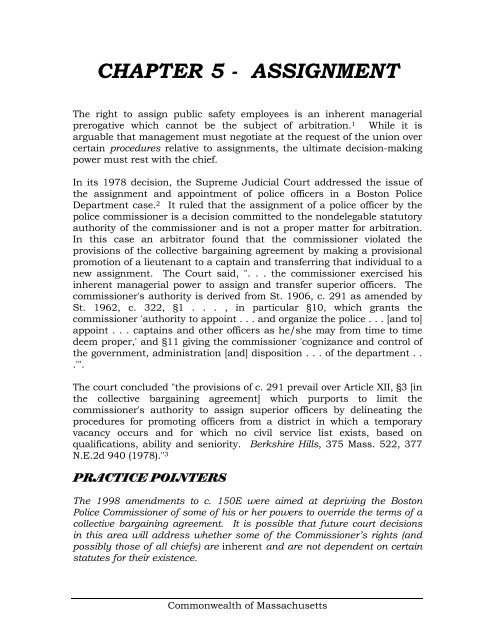Management Rights - AELE's Home Page
Management Rights - AELE's Home Page
Management Rights - AELE's Home Page
You also want an ePaper? Increase the reach of your titles
YUMPU automatically turns print PDFs into web optimized ePapers that Google loves.
CHAPTER 5 - ASSIGNMENT<br />
The right to assign public safety employees is an inherent managerial<br />
prerogative which cannot be the subject of arbitration. 1 While it is<br />
arguable that management must negotiate at the request of the union over<br />
certain procedures relative to assignments, the ultimate decision-making<br />
power must rest with the chief.<br />
In its 1978 decision, the Supreme Judicial Court addressed the issue of<br />
the assignment and appointment of police officers in a Boston Police<br />
Department case. 2 It ruled that the assignment of a police officer by the<br />
police commissioner is a decision committed to the nondelegable statutory<br />
authority of the commissioner and is not a proper matter for arbitration.<br />
In this case an arbitrator found that the commissioner violated the<br />
provisions of the collective bargaining agreement by making a provisional<br />
promotion of a lieutenant to a captain and transferring that individual to a<br />
new assignment. The Court said, ". . . the commissioner exercised his<br />
inherent managerial power to assign and transfer superior officers. The<br />
commissioner's authority is derived from St. 1906, c. 291 as amended by<br />
St. 1962, c. 322, §1 . . . , in particular §10, which grants the<br />
commissioner 'authority to appoint . . . and organize the police . . . [and to]<br />
appoint . . . captains and other officers as he/she may from time to time<br />
deem proper,' and §11 giving the commissioner 'cognizance and control of<br />
the government, administration [and] disposition . . . of the department . .<br />
.'".<br />
The court concluded "the provisions of c. 291 prevail over Article XII, §3 [in<br />
the collective bargaining agreement] which purports to limit the<br />
commissioner's authority to assign superior officers by delineating the<br />
procedures for promoting officers from a district in which a temporary<br />
vacancy occurs and for which no civil service list exists, based on<br />
qualifications, ability and seniority. Berkshire Hills, 375 Mass. 522, 377<br />
N.E.2d 940 (1978)." 3<br />
PRACTICE POINTERS<br />
The 1998 amendments to c. 150E were aimed at depriving the Boston<br />
Police Commissioner of some of his or her powers to override the terms of a<br />
collective bargaining agreement. It is possible that future court decisions<br />
in this area wil address whether some of the Commissioner’s rights (and<br />
possibly those of all chiefs) are inherent and are not dependent on certain<br />
statutes for their existence.<br />
Commonwealth of Massachusetts
















